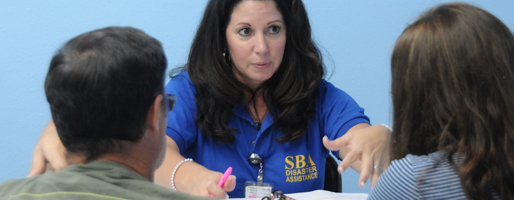This information applies to SBA disaster loans for individual unit owners of Homeowner Associations (HOAs), Planned Unit Developments (PUDs), condominiums and other common-interest developments.
Types of Disaster Loans Available to Qualified Applicants
SBA disaster loans of up to $200,000 are available to individual unit owners to repair or replace disaster damages not fully covered by insurance or other disaster recoveries. Individuals may also borrow up to $40,000 to replace damaged or destroyed personal property not covered by insurance, etc. Individuals may not borrow money to repair common areas that are the responsibility of the association.
If the development will not be repaired or rebuilt, individual unit owners may apply to SBA for relocation assistance. This means you may have eligibility for the full replacement value of your unit and your share of the common area minus any disaster recoveries you have received, up to our lending limits. You must submit a relocation plan to SBA for approval. If you don’t participate in the rebuilding of your association and you voluntarily relocate, you may borrow only the amount equal to your uncompensated losses. If you own a unit and it is a qualified rental property, you may apply to SBA for a disaster business loan.
Assessments
Unit owners may borrow funds to cover a one time assessment by the association for the repair of common areas. Any assessment amount is added to the amount you may borrow for unit repairs. The combined amount may not exceed $200,000 plus up to $40,000 for personal property.
Collateral
All disaster loans over $14,000 require collateral, generally real estate. This means that SBA will require a mortgage or deed of trust on the unit.
Refinancing
In some cases, SBA may be able to refinance existing mortgages up to the amount of the real estate damage or up to $200,000, whichever is less.
Loan Disbursement
-
Personal Property: SBA may disburse up to $14,000 initially if your loan includes personal property losses.
-
Real Estate: SBA requires a letter from the association confirming the proposed unit repairs will not be damaged when the common areas are repaired.
Common Area Damages
The Association may apply to SBA for up to $2 million to repair damages to the common areas.
What We Need To Process the Application
-
A completed Disaster Home Loan Application.
-
A completed Tax Information Authorization (IRS Form 8821).
-
Information on your personal insurance coverage for your unit and personal property, and any claims you may have filed.
-
Documentation of your association’s insurance coverage and any recoveries it may have received or filed.
-
A copy of any resolutions passed and the association’s conditions, covenants, and restrictions (CC&Rs) or Declaration and any amendments and all exhibitions.
NOTE: If we approve a loan for you, we will request a copy of the unit deed to the property.
Use of Loans
SBA disaster loans must be used to pay for disaster-related repairs. They cannot be used to pay for deferred maintenance items or any upgrades to the property, unless such upgrades are code required.
Mitigation
SBA disaster loans to repair or replace real property or leasehold improvements may be increased by as much as 20 percent of the total amount of disaster damage to real estate and/or leasehold improvements, as verified by SBA, to protect the damaged real property against possible future disasters of the same type.
For additional information, please contact our Customer Service Center. Call 1-800-659-2955 (TTY: 1-800-877-8339) or e-mail disastercustomerservice@sba.gov.

